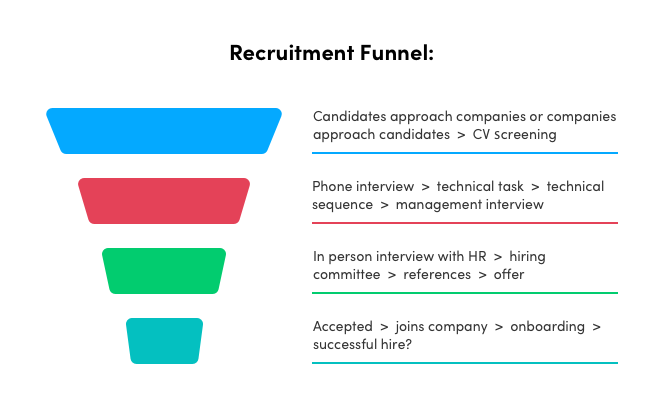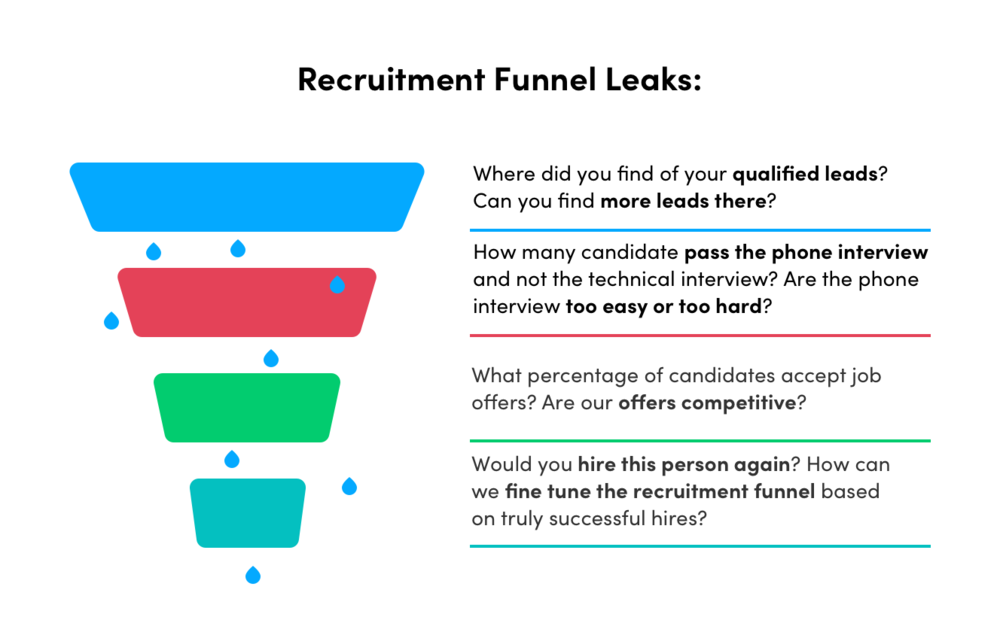When a startup is growing there is magic in the air and every employee contributes to the atmosphere almost like a musician in an orchestra. While the company is rapidly scaling it’s constantly hiring new employees to support its growth. You want your company to be a place where you nurture and attract great musicians for example but you also must ensure that they can play along with the rest of the band. For that to happen gifted candidates must fit the company’s culture.
monday.com‘s technical recruiter, Daniel Weisblat shared with us how they use their culture as a competitive advantage in recruiting the right talent and how you can too.
Help Wanted, Crème De La Crème Needed
monday.com hires only from the top 2% of the talent pool. Not only that, but a successful hire also requires having the right culture fit. Meaning, candidates must be able to ‘play’ their musical instrument while being in the same ‘key’ as the rest of the company.
How does a company scale and recruit mass quantities of only the top 2% in a competitive environment and ensure they have the culture fit?
Keep in mind; the best people don’t look for jobs, jobs find them, so companies must act fast.
“What Made This Challenge So Difficult?”
Behind the scenes of every job search are companies competing to pull top talents into their recruitment funnel. The best talents are fought over, every company tries to instill candidates with a fear of missing out both on the fun of joining the company but also the professional opportunity.

While you struggle to pull talents into your funnel, you have to ensure they can hit the right note. Meaning, that candidates have the relevant skillset.
How can recruiters work smart and efficiently? The monday.com recruitment team as an example receives thousands of resumes each month but less than 5% are relevant for the roles.
Company culture includes values, work ethic, ideology, and goals. It’s the reason why some star candidates shine one company but burn out in others. How can you determine if a candidate and a company will complement each other? How can you allow candidates to decide for themselves if they want to join the band because if they don’t fit the culture they won’t enjoy their time at the company?
“How Did You Try to Tackle This Challenge?”
To tackle these questions, monday.com uses their culture like a magnet to attract and repel candidates. The company based its recruitment process on core values, inspired by their company’s culture.
1) Data: Every stage in the recruitment funnel generates data that is collected and reviewed in a weekly report.

Every strain of information provides insight into how to reassess best practices and prioritize the process. Daniel regularly reviews each stage’s numbers to prevent any “leaks.” A leak could be the interviewer who accepts the fewest candidate. This employee might require training to improve their understanding of the process.
The HR department also compiled data regarding which practices their best employees shared regardless of job title. The superstars were all leaders, entrepreneurs at heart or in the past, team players, and craved feedback. Recruiters also determine what characteristics are required to succeed in that specific position. Recruiters then write the questions that help them identify both the general and particular values in candidates.
2) Exceptional and Egoless Candidate Experience: We’ve all been to interviews where we sat and basically read our CVs while reciting our life stories. You sit there, guessing what the interviewer wants to hear while they struggle to find signals you’re a good hire. Then, within 5 minutes of working with your new coworkers, you understand the company’s DNA and they get to know the real you.
That’s why the team now asks candidates to describe themselves in two sentences before diving into a project with their assessors. This “jam session” allows assessors to immediately see how candidates approach problems and collaborate with others. Both sides enjoy a more hands-on interview and can “sample” working together. By shaking up the usual interview practice monday.com hopes to achieve their goal of having all candidates enjoy the process whether they are hired or not.
Tearing down the wall between interviewer and the nervous candidate is part of monday.com’s goal to offer all candidates an “egoless experience”. Their orchestra has no “all-knowing conductor”. So candidates are encouraged and expected to voice their opinions freely just like they would if they joined the company. In addition, all candidates are asked for feedback on the process regardless of if they are hired because monday.com believes in learning from everyone.
3) Speed: Recruiters try to complete the hiring process as quickly as possible. That way, they don’t waste the candidate’s time while grabbing star talents as early as possible. Wait, doesn’t a shopping list of “must-have” characteristics and unconventional recruitment practices make hiring candidates more difficult? Yes, but that’s the point.
After they pass their technical skill-set interview, Daniel assesses their values to see if they beat to the same drum as the company. By not hiring someone she’s protecting the company’s culture and what she believes is her unfair advantage as a recruiter.
“Tell Me About A Failure”
Mistakes paved the road to these current recruitment practices. One blunder that Daniel learned from in particular is when they hired computer science graduates in hopes of adding young and coming ‘musicians’ to the company. HR’s mistake was testing the graduates the same way as all experienced hires. The monday.com team then treated junior employees the same as the more senior team members. Instead of giving these younger employees the training they required or judging them based on what they learned, they were treated like any other developer.
Most of these employees did not last in the company, but their influence did. Now, monday.com realizes they need to reassess their needs and those of junior employees. Different employees require different hiring, training, and onboarding processes. They now realize that companies have to weigh when to hire different types of employees and their ability to offer them the support they require.

“What Changes Have You Made in The Workplace?”
Another costly mistake that they learned a lot from was how they previously hired R&D team leaders. Candidates’ technical abilities were tested and then they experienced the monday.com culture. With this method, it took 270 days to fill a position from when it opened. That’s nine months for a single hire.
The recruiters reassessed and reversed their process. Today they first introduce the company’s culture and management style so candidates can determine if it suits them.
This change cut their hiring time to 38 days at first and now to as little as 20 at its best. This drop further proves that people aren’t their resume.
Resumes and abilities only tell you part of the story. That’s why when the company interviews potential employees such as product managers, they work on a problem facing the company together.
No one knows the right answer, but that’s not the point.
This challenge lets recruiters slip past the resume and see the person in front of them. Candidates’ personalities naturally shine through this process and assessors can compare it to the characteristics they deemed essential to succeed in the company and that specific position. In this case their analytical mind, product sense, ability to identify with customers, and how candidates handle trademarks within the product.
Every interview question reflects the company culture. For example, candidates are asked about their failures and what they learned from them. The company’s workflow is dynamic. Employees constantly are trying out new ideas, learning from their success and failure, before moving on to their next project without sentiment. How candidates interact with risk-taking and learning from their mistakes reflects their potential fit in the company.
The monday.com team has also discovered that one of the most efficient ways to find candidates with the right culture is to have their employees recruit them. The data shows that their BFF program has consistently led to the most successful hires. Today, the company systematically promotes it, after understanding that employees who live the culture are its best ambassadors and protectors.
“What Challenge Are You Still Struggling With?”
Imagine the talent pool is a pond. Let’s use Israel as an example.
Israel has the 100th largest population out of 233 counties in the world. It’s safe to say that’s a very small pond.
The HR team is still struggling with creating new ways to attract big fish from that small pond’s top 2%. The same can be said for our other expanding offices around the world.
How can they catch even more top talent while protecting the sweetest thing of all, the company culture?
HR branding is key so all candidates understand that joining the company want to join the company for a meaningful professional experience. She and the HR Team work on spreading monday.com’s culture to attract more superstar talent from across the globe even remotely.
On the other hand, Israel’s pond will run out of big fish with the right culture. The company see that looming challenge and is considering hiring junior R&D talents so they as a company can help them shine brighter in the future. Learning from the past to make a brighter future is exactly how monday.com makes its ‘music’.
Tips for Hiring Both Quality Employees by The Bulk
- An HR Department that works without data is working blindly. Scale and efficiency require data so you need to create a recruitment funnel that will generate measurable data.
- Once data opens your eyes, you can see your weaknesses and must respond accordingly.
- Each position requires specific capabilities and characteristics. Be a “smart shopper” when interviewing candidates.
- Determine what’s important for you before looking for candidates. It will make finding them simpler. Look for talent don’t look for a box to keep talent in. Let them break through.
- Focus on making your recruitment process reflect your company culture for your benefit and that of your candidates.
- After every interview ask yourself if you received a strong indication of whether or not the candidate fits your company. If your process doesn’t give you a strong signal either way, then it needs rethinking.
- Every once in awhile, reassess your hiring process because what you need today is not what you need tomorrow.



